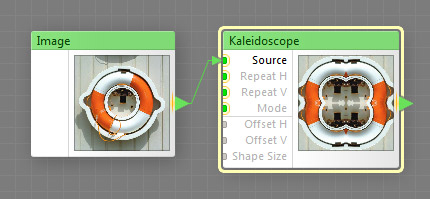
The Kaleidoscope component generates a kaleidoscopic pattern based on the image provided by the Source input. Internally, the component 'cuts' a polygonal fragment (the base shape) from the source image and distributes it across the output image to form the pattern. This is a map component, it can be located in the Patterns category on the Components Bar. Kaleidoscope is a discrete component: any filter that uses it is automatically classed as a discrete filter. This component can output HDR colors.
Source: Map Input (HDR), Required
Supplies the source image to be transformed into the kaleidoscopic pattern. This is a required input: to make the Kaleidoscope component work, this input must be connected. This input can accept HDR colors. Source is a so-called 'seamlessizer input' – it can safely accept connections from non-seamless components without preventing the resulting filter from generating seamlessly-tiled results.
Specifies how many times the pattern is repeated horizontally. The actual number of repetitions within the output image is also affected by the global parameter Size and the image width. For example, when Repeat H is 3, Size is 600 pixels and the image width is 1200 pixels, the pattern will be repeated 6 times within the image width.
When a map component is connected to this input, the number of repetitions is determined separately for different image areas by the HDR brightness level of the image supplied by that component. The number is calculated as the brightness level rounded to the nearest integer: the brightness level of 0 to 0.5 corresponds to the Repeat H value of 1, the level of 0.5 to 1.5 to the value of 2, 1.5 to 2.5 to the third item etc. Out-of-range values are clipped, which corresponds to the maximum value of 100.
Specifies how many times the pattern is repeated vertically. The actual number of repetitions within the output image is also affected by the global parameter Size and the image height. For example, when Repeat V is 5, Size is 500 pixels and the image height is 1000 pixels, the pattern will be repeated 10 times within the image height.
When a map component is connected to this input, the number of repetitions is determined separately for different image areas by the HDR brightness level of the image supplied by that component. The number is calculated as the brightness level rounded to the nearest integer: the brightness level of 0 to 0.5 corresponds to the Repeat V value of 1, the level of 0.5 to 1.5 to the value of 2, 1.5 to 2.5 to the third item etc. Out-of-range values are clipped, which corresponds to the maximum value of 100.
Defines the form of the base shape and the way its copies are aligned and distributed across the output image. The following modes are available: Square, Triangle 1, Triangle 2, Rhomb 1, Rhomb 2, Rhomb 3, and Hexagon. When a map component is connected to this input, the number of the selected list item is determined separately for different image areas by the HDR brightness level of the image supplied by that component. The item number is calculated as the brightness level rounded to the nearest integer: the brightness level of 0 to 0.5 corresponds to the first item, the level of 0.5 to 1.5 to the second item, 1.5 to 2.5 to the third item etc. Out-of-range values are clipped, which corresponds to the last item of the list.
Defines the horizontal position of the base shape within the source image. The value of 0 places the base shape on the left border of the image. Increasing the value shifts the base shape to the right.
Defines the vertical position of the base shape within the source image. The value of 0 places the base shape on the top border of the image. Increasing the value shifts the base shape to the bottom.
Defines the size of the base shape. The greater the Shape Size value, the more detailed the pattern. Setting this parameter to 0 is not recommended, as the base shape is reduced to a single point, which results in a pattern filled with a solid color.